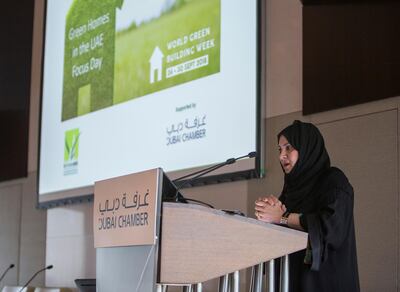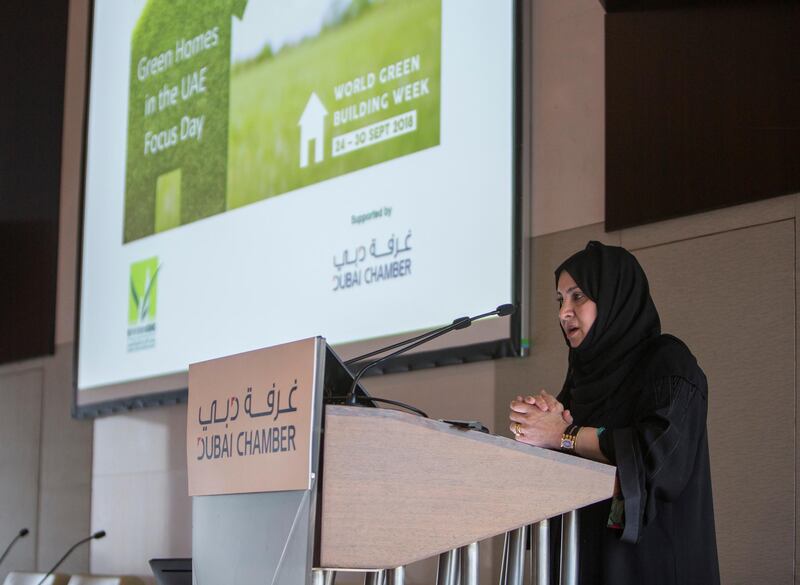The UAE government is investing to ensure that future Emirati housing communities are more sustainable.
Mohammed Al Mansouri, executive director of engineering at the Sheikh Zayed Housing Programme, spoke about new projects at the Green Homes in the UAE Focus Day, held at Dubai Chamber of Commerce and Industry.
The organisation has provided social housing for 59,000 beneficiaries since its inception in 1999. It has completed 36,000 homes for Emiratis, at a cost of Dh31 billion.
The figures were revealed yesterday at the event organised by Emirates Green Building Council as part of World Green Building Week.
Mr Al Mansouri
said the biggest challenge in sustainable housing was convincing people that benefits outweighed the costs.
“People want to feel an instant impact and don’t have the patience to see it as a long-term investment, they look at it as a useless addition when it comes to the final price of their home,” he said.
"We also faced challenges with local government authorities when we tried to convince them to change their codes to sustainable ones."

The move to residential housing communities was better for homeowners, who might otherwise build their own properties, and for the authorities.
“There are often hidden expenses in the building of individual houses, and people are not always aware of the risks involved when it comes to the individual market prices. Quite often the contracts are not clear either,” said Mr Al Mansouri.
"Residential neighbourhoods keep them away from all of this hassle."
The Sheikh Zayed Housing Programme has completed seven integrated residential neighbourhoods across the UAE, comprising 1,570 villas, with another three projects under construction for 1,990 units. Another three projects at the planning and design stage, for 1,260 villas.
"When we reach the year 2025, 7,200 villas will be delivered to UAE citizens by the Sheikh Zayed Housing Programme," he said.
The waiting list for social housing is 2.76 years, but Mr Al Mansouri, said he expected this to fall to two years by 2021.
The programme also provides loans to Emiratis who want to buy or build a new home, or for maintenance or an extension on their existing property.
If the applicant’s loan is more than Dh10,000 it must be paid back, but this is interest-free.
If the applicant's salary is Dh15,000 or less, it is repaid at Dh1,666 a month over 25 years. If the salary is above Dh15,000, 13.4 per cent of the salary is deducted for repayments.
In February, the UAE announced a Dh7.2 billion project to provide 7,270 homes for Emiratis by 2021.
_____________
Read more:
Thousands of jobs and homes to be created as part of Abu Dhabi investment plan
Why Sheikh Mohammed's new economic plans are a game changer for Abu Dhabi
Crown Prince reveals Tomorrow 2021 plan for Abu Dhabi's economy including Dh20bn for spending next year
_____________
The focus day event also raised the issue of lack of awareness of environmental matters among the public.
"The level of public awareness about green issues is quite low," said Aref Abou Zhar, executive director of energy efficiency company Taqati.
Mr Zhar's company is a subsidiary under the Dubai Electricity and Water Authority, to reduce utility consumption by 30 per cent by 2030. But he said a survey showed only 30 per cent of people were aware of it.
Amer Arafat, technical manager of Dubai Carbon, said: "In February, we ran a scheme in Hatta offering to install solar panels in people's homes for free. A lot of people declined it, even though it was free, so we have a challenge to change attitudes."
The project, with Dewa, targeted 640 homes , with 400 homeowners opting for solar panel installation.







